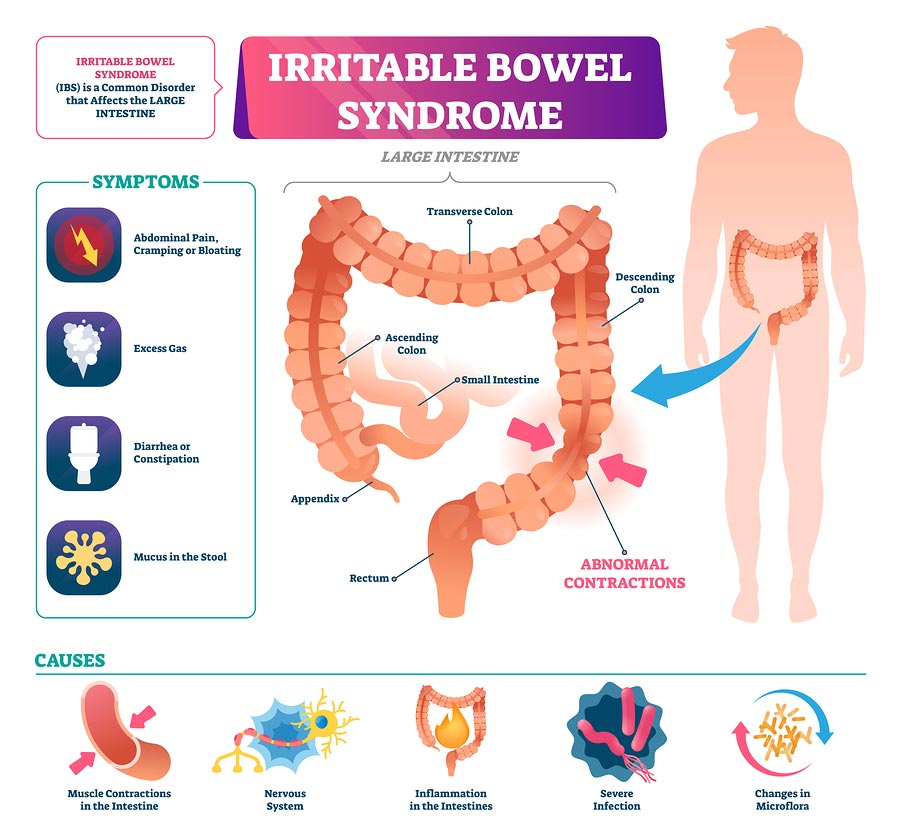Medically Reviewed by Jacque Parker, RN

Your boss, your spouse, your mother-in-law, your bills, the I.R.S.- life is hard enough and going to the bathroom shouldn’t be. But for 20 million people the urge to go to the bathroom can be agonizing. The reason is a disorder known as irritable bowl syndrome (IBS).
Irritable bowel syndrome is a common disorder of the intestines that leads to crampy pain, gasiness, bloating, and changes in bowel habits. Some people have constipation, some people have diarrhea, and some people have both. In the past it has been known as spastic colon or colitis, but this has been found to be untrue. It is, instead, a functional bowl disorder without evidence of disease. It doesn’t cause permanent harm to the intestines, it doesn’t lead to intestinal bleeding, and it doesn’t cause cancer. It can, however, be extremely annoying and possibly debilitating.
Our large intestine is controlled by nerves, hormones and electrical activity that propels the fecal material in the colon toward the rectum. This propelling action, or muscle contraction occurs a few times each day and some of them result in a bowl movement. A normal movement is one that is formed but not hard, contains no blood and is passed without cramps or pain. Why people develop irritable bowel syndrome is unknown, but one theory is people with IBS seem to have large intestines that are more sensitive and respond strongly to stimuli that would not bother most people. Stimulation can be from emotional stress or over distention from gas. An over distended colon is usually due to inadequate amounts of fiber in our diets. Fiber, with its ability to maintain colonic health, has, unfortunately been compromised with the evolution of processed foods.

Do you think you have irritable bowel syndrome? Well, if you have bleeding, fever, weight lost, and persistent severe pain with your bowl movements, you do not have IBS. IBS is usually diagnosed after the exclusion of more serious conditions such as Crohn’s disease or ulcerative colitis. It may be necessary to do endoscopy (viewing the colon through a flexible tube inserted through the anus) to rule out those other diseases.
So, how do you treat irritable bowel syndrome? There are prescription drugs that can control colonic muscle spasms or slow the movement of food through the digestive system. You can even take laxatives if you are constipated or use fiber supplements to regulate bowl movements, however, fiber from the foods you eat is preferable. Whole grain breads, cereals, beans fruits are good sources of fiber.
It is recommended that you eat just enough fiber so that you have soft, easily passed and painless bowl movements. You have to be careful though; high fiber diets can cause gas and bloating, so incorporate it gradually into your diet. Some tips in combating this syndrome:
1. Keep a diary or journal of what foods cause distress.
2. Eat smaller portions. Large meals can over distend the colon and create spasms. 3. Work hard on eliminating stress from your life.
Did you find this article helpful? Join us at HealingWell for support and information about Irritable Bowel Syndrome. Connect and share with others like you.
Celeste E. Williams, M.D., is a board certified OB/GYN, Dr. Williams is a fellow of the American Board of OB/GYN.




